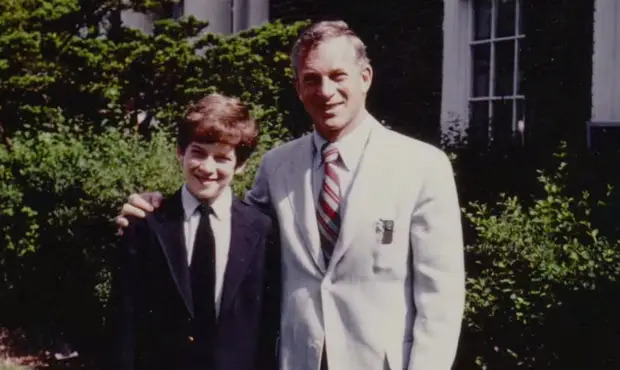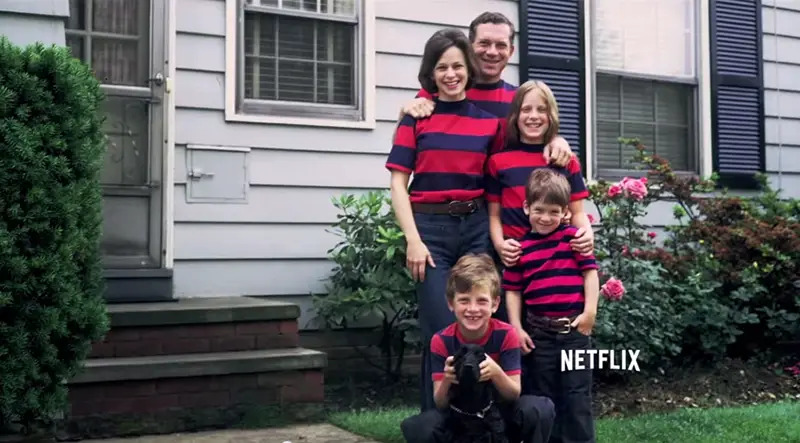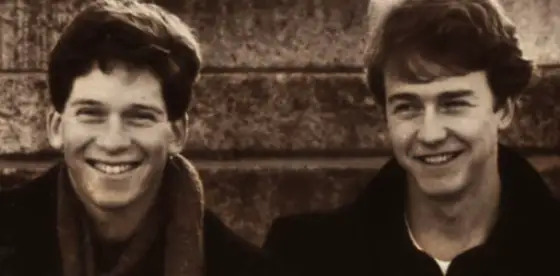The impending birth of his first son causes a Brooklyn documentary filmmaker to reflect on his relationship with his own father. Here, Sampliner writes about the searching doubt that led him to create the film ‘My Own Man,’ produced by Edward Norton.
|
David Sampliner (left) as a young man, with his father |
I used to dread Sunday evenings. When I went away to college, Sunday was the night I was expected to call home. Even after college when I moved to New York, I continued the ritual.
But more and more, that’s how it felt: a mere ritual, an empty formality, devoid of real feeling. I don’t remember deciding to cut my parents out of my life. I only remember growing more uncomfortable with the fraudulence of the ritual, and without fully acknowledging it or reckoning with it, every Sunday night turned into every third Sunday, and then the calls became even more infrequent.
I don’t know if I ever “stopped talking to my parents,” but I definitely had stopped sharing myself with them. I felt gratitude for them as providers, but almost no connection to them as people.
And that’s how it was for 20 years.
|
Sampliner grew up in Shaker Heights, Ohio. |
Then my fiancee Rachel and I learned we were having our first child.
I never doubted that I would be a better father than my father. I thought of myself as more “evolved.” I’d been to therapy. I spent time exploring myself and the world, doing the sort of self-enrichment that seemed luxurious, not to mention self-indulgent, to my father. To me, I was doing the work of self-discovery that would make me a more compassionate and nurturing dad.
That was all before the St. Luke’s-Roosevelt nurse performing the ultrasound blew up the image of our child in the womb on the screen and drew an imaginary circle around the visible genitalia.
It hit home. I wasn’t just going to be a father; I had to guide a boy into manhood. Suddenly it seemed painfully clear I knew virtually nothing about either.
I knew one thing: I didn’t want to be a man in the mold of my own father. He believed in the gospel of John Wayne, and lived it. The bravado and arrogance, the pride in physical and mental toughness, the bone-deep aversion to emotional vulnerability.
|
“In our circle of friends, [David] and I were the least inclined toward what I would call ‘macho’ behavior,” says Edward Norton (right), who grew up with Sampliner (left). |
I was his opposite. When the going got tough, I got rattled. I was graceless under pressure. Or in my father’s blunt phrase, a “head case.”
We weren’t merely cut from different cloth. We made different choices. At 30 my father had three children and was a practicing surgeon; at 29, I had quit a Ph.D. program in history and began living out of my car. I ended up a waiter in Athens, GA, where I eventually found my way into documentary filmmaking before moving back to New York City.
My circuitous path to a career mystified my father, concerned him, and though I think he felt like he was trying to support me, it felt like disapproval to me. I certainly disapproved of him.
Hence the dread of those Sunday evening phone calls.
But now I was faced with fathering a son. What kind of man and father would I be? “Not my dad” was no longer a good enough answer.
The clock was ticking. My son would arrive in six months.
So I turned to the thing I knew how to do best: soul-searching. I also turned to my other area of expertise, and decided to make a film about my son-induced manhood panic.
As part of the film, I consulted Lauren Zander, a life coach. Lauren asked me about my relationship with my father, and when I’d finished, she said, you know, when you talk about your dad, you sound a lot like your dad. He’s an unforgiving hard-ass? What about you?
I wasn’t going to become a new man in six months. But I could start to have the kind of relationship with my dad that I wanted my son to have with me. I began to believe what Lauren kept insisting, that I would have to feel real love for my dad if I wanted my son to feel that way about me. Or to put it another way, if I wanted my son to call me on Sunday evenings, I was going to have to pick up the phone and start talking to my own father.
As the gods would have it, my son was born the day before my father’s birthday. Three years and eight days later, our second son arrived. I now have three males in my family, all born under the sign of the Bull.
And I thought the hardest thing would be learning to love my father.
The real work, as my father knew all along, is ahead of me.
‘My Own Man’ Debuts on Netflix March 6
David is about to become a father and he’s terrified. How can he bring his son into manhood if he feels like he hasn’t arrived himself? He tries various methods of tapping into his masculinity, but all roads lead back to the complicated relationship with his own father. My Own Man is a funny and original look into the timeless tug of war between fathers and sons, and a moving story about the transformative power of forgiveness. The film, directed by Sampliner and produced by Edward Norton, streams on Netflix starting March 6.






















